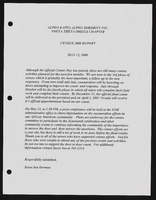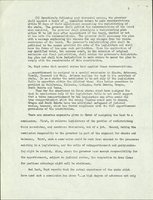Search the Special Collections and Archives Portal
Search Results

Alpha Kappa Alpha Sorority, Theta Theta Omega Chapter connection committee and Census 2000 reports
Date
Archival Collection
Description
From the Alpha Kappa Alpha Sorority, Incorporated, Theta Theta Omega Chapter Records (MS-01014) -- Chapter records file.
Text
Southern Nevada Daughters of the American Revolution Records
Identifier
Abstract
The Southern Nevada Daughters of the American Revolution Records primarily document the activities of three Southern Nevada chapters of the National Society Daughters of the American Revolution from 1950 to 2024. The materials center around the records of three chapters from Southern Nevada: Old Spanish Trail, Francisco Garces, and Valley of Fire. Materials include administrative records, scrapbooks, photographs, news clippings, and correspondence about the activities of the Daughters of the American Revolution chapters. Mateirals also include some records and scrapbooks from the Nevada State Society of DAR.
Archival Collection
Richard and Sheilagh Brooks Papers
Identifier
Abstract
The Richard and Sheilagh Brooks Papers (1919-2003) are comprised of materials collected during their tenure as professors of Anthropology and Archaeology at the University of Nevada, Las Vegas (UNLV). Included are correspondence, research papers, photographs, reports, books, article reviews, and student scholarship. There is also a file on reburial issues that contains correspondence and an amendment to Nevada State law regarding the handling of exhumed bodies.
Archival Collection
Florence McClure Papers
Identifier
Abstract
The Florence McClure Papers (1969-2007) are comprised of writings, correspondence, newspaper clippings, handwritten notes, and assorted publications that focus on McClure's work with women's organizations, her efforts on behalf of the Southern Nevada Women's Correctional Facility, and her political advocacy work. It also contains a large number of reference clippings McClure collected on women's issues from local, national, and international publications.
Archival Collection
Dorothy Dorothy Photograph Collection
Identifier
Abstract
The Dorothy Dorothy Photograph Collection (approximately 1910-1985) consists of black-and-white photographic prints and negatives as well as colored transparencies of Dorothy Dorothy. Included are photographs of campaigns, meetings, and banquets with various local and federal politicians. Also included are photographs of her husband, Dale Dorothy, and their ranch in Pahrump, Nevada.
Archival Collection

Transcript of interview with Elbert Edwards by Layne Covington, October 16, 1986
Date
Archival Collection
Description
On October 16, 1986, Layne Covington interviewed Elbert Edwards (born 1907 in Panaca, Nevada) about his life in Southern Nevada. Edwards first talks about his family background before talking about what it was like to live in Panaca. He then talks about changes in Southern Nevada, particularly those in Boulder City that have taken place over time. Edwards later talks about the work of his wife and both of their political involvement and his involvement and career in education. The latter part of the interview includes discussion of the building of Boulder Dam, Edwards’ job as a registrar in the Selective Service, and the effects that the war years had on Las Vegas.
Text

Margie Llorente Gonzales oral history interview: transcript
Date
Archival Collection
Description
Oral history interview with Marietta "Margie" Llorente Gonzales conducted by Cecilia Winchell, Vanessa Concepcion, and Stefani Evans on November 1 and 22, 2021 for Reflections: The Las Vegas Asian American and Pacific Islander Oral History Project. Margie Llorente-Gonzales discusses her upbringing in Manila, the Philippines and her family history within the country, recalling the lives of her parents, grandparents, and great grandparents. She talks about her childhood, educational pursuits, and courtship with her husband in the Philippines. Margie shares how she and her husband immigrated to the United States, how she adapted to her new life as an immigrant dependent on her extended family, and how she and her husband came to settle in Las Vegas. She talks about her artistic pursuits in the forms of dance choreography and performing, scriptwriting, broadcasting, and publishing newsletters. Margie also discusses her employment at McCarran Airport and her political activism, canvassing, and committee work in the Philippines and the United States.
Text

Summary report by the League of Women Voters on Legislative Reapportionment, "The Nevada Reapportionment Decision," October 1965
Date
Archival Collection
Description
League of Women Voters statement on legislative reapportionment and redistricting in Nevada.
Text

Meeting minutes for Consolidated Student Senate University of Nevada, Las Vegas, November 15, 1984
Date
Archival Collection
Description
Text

Transcript of interview with Arby Hambric by Claytee D. White, September 23, 2015
Date
Archival Collection
Description
Arby L. Hambric's book entitled, "To Thee I See: From picking in the fields of Texas to cooking for dignitaries on U.S. Navy ships, a journey I wouldn't change," describes his profound journey from working in the cotton fields as a child to being drafted into the U.S. Navy, before completing high school. During this interview, he recalls the significant achievements of the "Red Tails" and the Tuskegee Airmen. Beginning his 20 year Navy career before military integration, Arby describes the racial tensions that plagued the U.S. Navy in the 1940s, and discusses how he was able to successfully navigate that racist environment for two decades and three war eras. Arby enrolled in San Diego State College after leaving the U.S. Navy. He also worked as maintenance personnel for Sears and Roebuck and started a catering business with his wife. He became a member of the Southern Nevada Enterprise Community, SNEC Board upon moving to Las Vegas, Nevada, after his wife died. With a family legacy he can be proud of, Arby highlights the achievements of his great grandson Taquan Mizzell, a Virginia Cavaliers running back at the University of Virginia. As a Navy veteran, Arby often volunteered his time and resources to help others in need. He recalls driving the sick and elderly back and forth from the Westside community to Valley Hospital or University Medical Center, UMC. He also discusses government enforced road closures and a wall that was built to block Blacks from entering the new downtown. This interview sheds new light on military integration and offers key strategies for overcoming environmental racism. Arby mentions a documentary about the closing of the wall and offers his predictions on the future of the Westside.
Text
